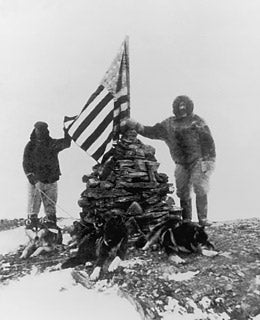April 2

1917
Jeannette Pickering Rankin, the first woman ever elected to Congress, took her seat in the U.S. Capitol as a representative from Montana. She successfully ran for Congress in Montana on a progressive Republican platform calling for total women’s suffrage, legislation protecting children, and U.S. neutrality in the European war. Following her election as a representative, Rankin’s entrance into Congress was delayed for a month as congressmen discussed whether a woman should be admitted into the House of Representatives.


1931
Virne “Jackie” Mitchell became the first woman to play for an all-male pro baseball team. In an exhibition game against the New York Yankees, she struck out both Babe Ruth and Lou Gehrig. As a girl in Memphis, she’d allegedly been tutored in baseball by a neighbor and minor-league pitcher, Charles Arthur “Dazzy” Vance, who would go on to lead the National League in strikeouts for seven straight seasons. Mitchell was a multi-sport athlete and joined a baseball school affiliated with Chattanooga’s Class AA minor-league team, the Lookouts, and attracted attention with her sinking lefty curveball.

1992
A jury in New York found mobster John Gotti, nicknamed the Teflon Don for his ability to elude conviction, guilty on 13 counts, including murder and racketeering. In the wake of the conviction, the assistant director of the FBI’s New York office, James Fox, was quoted as saying, “The don is covered in Velcro, and every charge stuck.” On June 23 of that year, Gotti was sentenced to life in prison, dealing a significant blow to organized crime. The mob boss was sent to the U.S. Penitentiary at Marion, Illinois, where he was held in virtual solitary confinement. On June 10, 2002, Gotti died of throat cancer at age 61 at a Springfield, Missouri, medical center for federal prisoners.
April 3

1860
The first Pony Express mail debuted when relay teams, traveling by horse, simultaneously left St. Joseph, Missouri, and Sacramento, California. Ten days later, on April 13, the westbound rider and mail packet completed the approximately 1,800-mile journey and arrived in Sacramento, beating the eastbound packet’s arrival in St. Joseph by two days and setting a new standard for speedy mail delivery. Although ultimately short-lived and unprofitable, the Pony Express captivated America’s imagination and helped win federal aid for a more economical overland postal system. With the advent of the first transcontinental telegraph line in October 1861, the Pony Express ceased most of its operations.

1882
One of America’s most famous criminals, Jesse James, was shot to death by fellow gang member Bob Ford, who betrayed James for reward money. For 16 years, Jesse and his brother, Frank, committed robberies and murders throughout the Midwest. Detective magazines and pulp novels glamorized the James gang, turning them into mythical Robin Hoods who were driven to crime by unethical landowners and bankers. In reality, Jesse James was a ruthless killer who stole only for himself. His tombstone reads, “Jesse W. James, Died April 3, 1882, Aged 34 years, 6 months, 28 days, Murdered by a traitor and a coward whose name is not worthy to appear here.”

1996
Ronald H. Brown, the U.S. secretary of commerce, was killed along with 32 other Americans when their U.S. Air Force plane crashes into a mountain near Dubrovnik, Croatia. Brown was leading a delegation of business executives to the former Yugoslavia to explore business opportunities that might help rebuild the war-torn region. In 1993, Clinton appointed Brown to be the first African American secretary of commerce, a position he held until his death in 1996. Previously, he served as the Chairman of the Democratic Party National Committee, becoming the first African American to hold the top position in a major political party in the United States.
April 4

1841
President William Henry Harrison died after serving only 32 days in office on this day in 1841. Harrison holds the unfortunate presidential record of shortest term in office. Ironically, the man with the shortest White House tenure delivered the longest inaugural address in history, which may have been his undoing. This first presidential speech, delivered on a bitterly cold March morning, clocked in at one hour and 45 minutes. Harrison went to bed at the end of inauguration day with a bad cold that soon developed into a fatal case of pneumonia. Some historians have claimed that a case of hepatitis may also have contributed to his demise. Harrison was the last president born as an English subject before the American Revolution.

1968
Martin Luther King Jr. was fatally shot while standing on the balcony outside his second-story room at the Lorraine Motel in Memphis, Tennessee. The civil rights leader was in Memphis to support a sanitation workers’ strike and was on his way to dinner when a bullet struck him in the jaw and severed his spinal cord. King was pronounced dead after his arrival at a Memphis hospital. He was 39 years old.

1975
Childhood friends Bill Gates and Paul Allen founded the computer software company Microsoft. Originally based in Albuquerque, NM, Microsoft relocated to Washington State in 1979 and eventually grew into a major multinational technology corporation. In 1987, the year after Microsoft went public, 31-year-old Gates became the world’s youngest billionaire. Microsoft would soon become the world’s biggest personal-computer software company, based on sales. In 2001, Microsoft joined the video-game market with the launch of its Xbox console.
April 5

1933
President Franklin D. Roosevelt established the Civilian Conservation Corps (CCC), an innovative federally funded organization that put tens of thousands of Americans to work during the Great Depression on projects with environmental benefits. Of Roosevelt’s many New Deal policies, the CCC is considered by many to be one of the most enduring and successful. It provided the model for future state and federal conservation programs. In 1942, Congress discontinued appropriations for the CCC, diverting the desperately needed funds to the effort to win World War II.

1984
Kareem Abdul-Jabbar scored the 31,420th point of his career, breaking the NBA’s all-time scoring record, which had been held by Wilt Chamberlain. Over 18,000 fans gathered at the Thomas and Mack Center at the University of Nevada, Las Vegas, to watch the Utah Jazz play Abdul-Jabbar and the Los Angeles Lakers on April 5. With less than nine minutes left in the game, Magic Johnson passed the ball to his 7’2″ teammate and Abdul-Jabbar scored his 22nd point of the night and 31,420th point of his career. The game stopped as Abdul-Jabbar’s teammates rushed to congratulate him and the fans gave him an extended standing ovation.

1994
Kurt Cobain, modern rock icon and lead singer of Nirvana, committed suicide in his Seattle, Washington home by ingesting fatal levels of heroin and Valium. Found three days later, some skeptics questioned the circumstances of his death and pinned responsibility on his wife, Courtney Love. However, Cobain's downward spiral began months previously and his battle with heroin and depression were well documented. In the apartment above the garage was Cobain’s suicide note, quoting Neil Young’s lyric that it is “better to burn out than to fade away.” Nirvana and Cobain continue to influence modern rock culture and they were elected into the Rock & Roll Hall of Fame in 2014.
April 6

1830
In Fayette, New York, Joseph Smith, founder of The Church of Jesus Christ of Latter-day Saints (also known as the Mormon Church), organized the Church of Christ during a meeting with a small group of believers. Smith claimed in 1823 that he had been visited by a Christian angel named Moroni who spoke to him of an ancient Hebrew text that had been lost for 1,500 years. The holy text related the story of Israelite peoples who had lived in America in ancient times. Over the course of the next six years, Smith dictated an English translation of this text to his wife and other scribes, and in 1830 The Book of Mormon was published. In the same year, Smith founded the Church of Christ—later known as the Church of Jesus Christ of Latter-day Saints—in Fayette.
 .
. 
1909
American Navy engineer and explorer Robert Peary accomplished a long elusive dream, when he, assistant Matthew Henson and four Inuits reach what they determined to be the North Pole. Soon after, Dr. Frederick A. Cook challenged Peary, claiming he had already reached the pole by dogsled the previous year. A major controversy followed, and in 1911 the U.S. Congress formally recognized Peary’s claim. Decades after Peary’s death, however, navigational errors in his travel log surfaced, placing the expedition in all probability a few miles short of its goal. Further studies of the conflicting claims suggest that neither expedition reached the exact North Pole, but that Peary and Henson came far closer, falling perhaps 30 miles short.

1917
Two days after the U.S. Senate voted 82 to 6 to declare war against Germany, the U.S. House of Representatives endorsed the declaration by a vote of 373 to 50, and America formally entered World War I. On June 26, the first 14,000 U.S. infantry troops landed in France to begin training for combat. After four years of bloody stalemate along the western front, the entrance of America’s well-supplied forces into the conflict marked a major turning point in the war and helped the Allies to victory. When the war finally ended, on November 11, 1918, more than two million American soldiers had served on the battlefields of Western Europe, and some 50,000 of them had lost their lives.
April 7

1954
President Dwight D. Eisenhower coined one of the most famous Cold War phrases when he suggested the fall of French Indochina to the communists could create a “domino” effect in Southeast Asia. The so-called “domino theory” dominated U.S. thinking about Vietnam for the next decade. The U.S. government used the now-discredited theory to justify its involvement in the Vietnam War and its support for a non-communist dictator in South Vietnam. In fact, the American failure to prevent a communist victory in Vietnam had much less of an impact than had been assumed by proponents of the domino theory. With the exception of Laos and Cambodia, communism failed to spread throughout Southeast Asia.

1970
The legendary actor John Wayne won his first—and only—acting Academy Award, for his star turn in the director Henry Hathaway’s Western True Grit. Wayne’s Oscar for True Grit at the 42nd annual Academy Awards was generally considered to be a largely sentimental win, and a long-overdue reward for one of Hollywood’s most enduring performers. The Academy had failed to even nominate Wayne for any of his most celebrated performances, including The Searchers (1956), considered by many to be the greatest Western ever made.

1979
Nearly a year after his brother Bob pitched a no-hitter, Houston Astros pitcher Ken Forsch tossed his first career no-hitter. Ken and Bob became the first—and only—brothers to pitch official no-hitters in Major League Baseball history. On April 16, 1978, Bob Forsch pitched a no-hitter for the St. Louis Cardinals against the Philadelphia Phillies. Brothers Pascual and Melido Pérez pitched rain-shortened, unofficial no-hitters—Pascual in five innings for the 1988 Montreal Expos and Melido in six innings for the 1990 Chicago White Sox.
April 8
 .
. 
1974
Hank Aaron of the Atlanta Braves hits his 715th career home run, breaking Babe Ruth’s legendary record of 714 homers. A crowd of 53,775 people, the largest in the history of Atlanta-Fulton County Stadium, was with Aaron that night to cheer when he hit a 4th inning pitch off the Los Angeles Dodgers’ Al Downing. Aaron hung up his cleats in 1976 with 755 career home runs—a record that stood until 2007. He went on to become one of baseball’s first African American executives, with the Atlanta Braves, and a leading spokesperson for minority hiring. Hank Aaron was inducted into the Baseball Hall of Fame in 1982. He died on January 22, 2021, at age 86.

1993
The space shuttle Discovery lifted off from the Kennedy Space Center with astronaut Ellen Ochoa on board, the first Hispanic woman in space. Ochoa started at NASA in 1988 after receiving a doctorate in electrical engineering from Stanford University. Two years later, she was selected as an astronaut. On her first mission, Ochoa served as a Mission Specialist on a 9-day space flight, the primary mission of which was to study Earth's ozone layer. She went on to fly three more space shuttle missions. She holds several patents for technologies related to automated space exploration and served as Director of the Johnson Space Center. Among numerous other awards, she has received NASA's highest honor, the Distinguished Service Medal.

2009
The MV Maersk Alabama was hijacked off the coast of Somalia, the first ship sailing under the American flag since the 1820s to be hijacked by pirates. Just a day before the attack, the Maersk Alabama received warning from the US government to stay at least 600 miles off the coast of Somalia, but Captain Richard Phillips kept the ship about 240 miles from the coast. Four pirates were able to board and took Phillips as hostage in a lifeboat. After a three day standoff, President Obama authorized Navy SEAL snipers to open fire. With stunning accuracy, three pirates were killed while Phillips was rescued unharmed. The incident received international attention, bringing the problem of modern-day piracy to many people’s attention for the first time.




